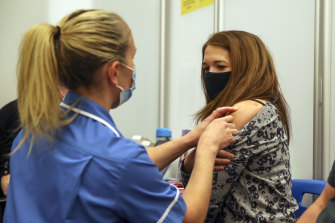“They used the map to identify people who didn’t live in San Francisco. ‘Patient O’ stood for ‘outside’, not zero,” Carswell says. Dugas volunteered to help researchers trace the spread of HIV. The media thanked him by turning him into a monster after his death.
News outlets exploit the ‘patient zero’ myth to generate clicks and to comfort readers by laying blame on individuals – typically minoritised people. Either way, patient zero stories deny the complexity of public health crises and become a witch hunt for a villain.

Trust is a critical element in efforts to contain the COVID-19 pandemic.Credit:PA
It’s painful for people living with HIV to hear a term saturated in homophobia and HIV stigma from the mouths of clinicians, journalists, and politicians. To call individuals “patient zeros” and “spreaders” perverts public health principles by heaping blame on sick people who need care.
This kind of coverage undermines trust, a critical element in efforts to contain the COVID-19 pandemic. Drawing on the experience with HIV, we know that blame deters people from getting tested. Nobody wants to be a “patient zero” and have the press prosecute them in the court of public opinion.
This media panic may also deter people from cooperating with contact tracers for similar reasons, much like COVID fines. Meanwhile, excessive focus on individuals distracts from asymptomatic cases, government blunders, and social problems such as homelessness and insecure work.
Media representations create an image of the world. When people internalise negative depictions of themselves, it has far-reaching consequences. The fear that media whipped up about HIV/AIDS in the ’80s continues to harm people, such as those who put off testing for years or turn to destructive behaviours out of shame.

It is impossible to say how long it will take to repair the damage done by negligent reporting during the COVID-19 pandemic.Credit:Eamon Gallagher
Decades later, we have effective treatments for HIV. Still, the first question a newly diagnosed person might ask is whether anyone will ever love them again? For this reason, it is impossible to say how long it will take to repair the damage done by negligent reporting during the COVID-19 pandemic.
Editors and journalists often believe that their job is to speak truth to power. However, in disseminating mass information, they wield immense power of their own. They have a responsibility to avoid hostile terms and should refuse to stir up blame.
Loading
Come the next outbreak or even the next pandemic, what we don’t want to see is more people covering their faces in fear.
Joshua Badge is a queer writer living on Wurundjeri land in Melbourne and a volunteer in public health policy. Twitter @joshuabadge
Emil Cañita is a Peer Navigator and Community Engagement Officer at Living Positive Victoria.
There is support available if you are a person living with HIV. Call or visit Living Positive Victoria (03 9863 8733), Positive Life NSW (02 9206 2177) or Queensland Positive People (07 3013 5555). You can find a full list of peer support services here.

